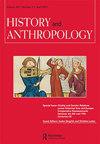The rise and demise of Ashkenazi cuisine in Israel/Palestine: The marginalization of the foodways of a hegemonic ethnicity
IF 0.4
2区 历史学
Q3 ANTHROPOLOGY
引用次数: 0
Abstract
Food plays a central role in the construction of national and ethnic identities. This article examines the marginalization of Ashkenazi (Jews of European descent) cuisine in Israel/Palestine, despite the dominance and hegemonic status of Ashkenazi identity in Israeli society. By examining the foodways of a ‘hegemonic ethnicity’, we expand upon previous research on ethnic identities in migrant communities. By analyzing the culinary processes of adaptation, simplification, and vulgarization that East-European fare underwent in Israel/Palestine, as well as the social contexts of the centrality of the Holocaust in Israeli cosmology and the consolidation of Mizrahi identity, we explain the rise, demise (and, perhaps, revival) of Ashkenazi cuisine in this country. Drawing on ethnographic and primary historical sources, this socio-historical analysis uncovers the intermittent processes of marginalization and estrangement, as well as the dynamic and contingent nature of the de-ethnization and re-ethnization of hegemonic ethnicities’ cultural practices.阿什肯纳兹美食在以色列/巴勒斯坦的兴起和消亡:一个霸权民族的食物方式的边缘化
食物在国家和民族认同的构建中起着核心作用。本文探讨了德系犹太人(欧洲血统的犹太人)烹饪在以色列/巴勒斯坦的边缘化,尽管德系犹太人身份在以色列社会中占据主导地位和霸权地位。通过研究“霸权种族”的食物方式,我们扩展了先前对移民社区种族身份的研究。通过分析东欧美食在以色列/巴勒斯坦经历的适应、简化和庸俗化的烹饪过程,以及大屠杀在以色列宇宙观中的中心地位和米兹拉希身份的巩固的社会背景,我们解释了德系犹太人美食在这个国家的兴起、消亡(也许还有复兴)。利用民族志和原始历史资料,这种社会历史分析揭示了边缘化和异化的间歇性过程,以及霸权民族文化实践的去族群化和再族群化的动态和偶然性质。
本文章由计算机程序翻译,如有差异,请以英文原文为准。
求助全文
约1分钟内获得全文
求助全文
来源期刊

History and Anthropology
Multiple-
CiteScore
1.80
自引率
0.00%
发文量
41
期刊介绍:
History and Anthropology continues to address the intersection of history and social sciences, focusing on the interchange between anthropologically-informed history, historically-informed anthropology and the history of ethnographic and anthropological representation. It is now widely perceived that the formerly dominant ahistorical perspectives within anthropology severely restricted interpretation and analysis. Much recent work has therefore been concerned with social change and colonial history and the traditional problems such as symbolism, have been rethought in historical terms. History and Anthropology publishes articles which develop these concerns, and is particularly interested in linking new substantive analyses with critical perspectives on anthropological discourse.
 求助内容:
求助内容: 应助结果提醒方式:
应助结果提醒方式:


